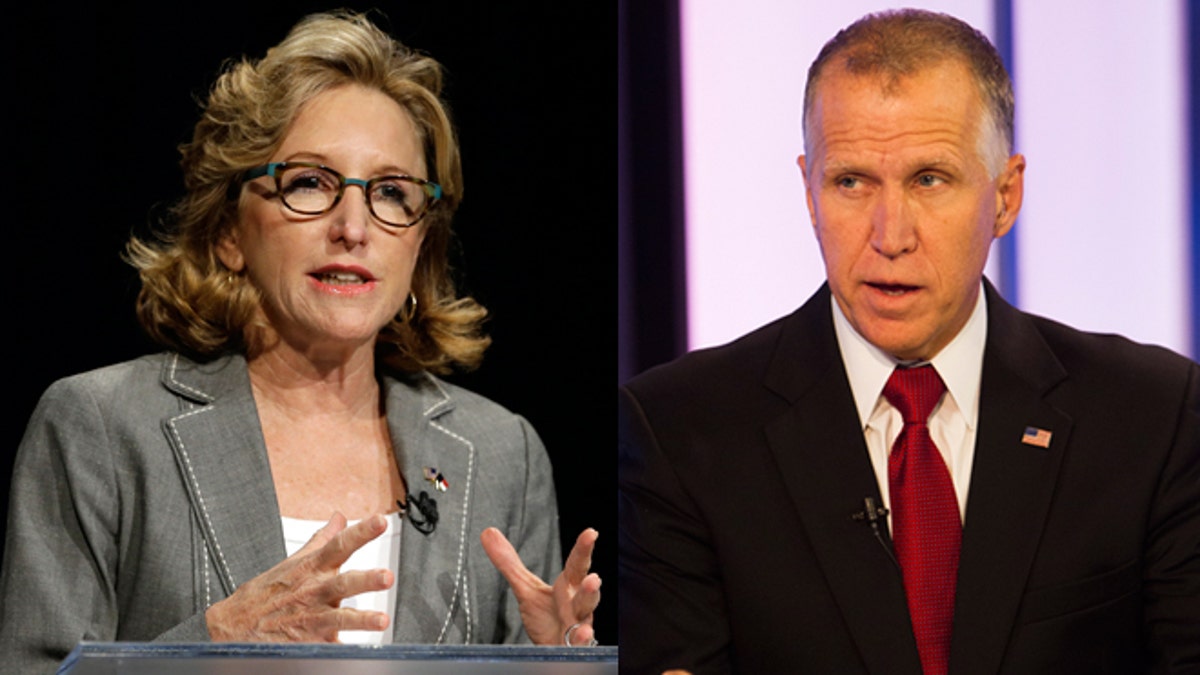
Latinos in North Carolina might become the determining factor in deciding who wins North Carolina’s Senate race.
Thom Tillis, a Republican businessman who is the state speaker of the House, and Democratic incumbent Senator Kay Hagan are battling in a state where Hispanics are 9 percent of the population – having more voting power than ever before.
“It is very close," said North Carolina political strategist Larry Shaheen. "The Latino vote is going to be very crucial in this election.”
Political experts also say North Carolina is like a microcosm of what is happening throughout the county, where Latino voters are becoming more important in elections. A similar situation is happening in Georgia’s senate race with Michelle Nunn and David Perdue battling it out for a senate seat in a state that also has a nine percent population of Hispanics and Latinos.
But the changes being wrought by Latinos go beyond state-wide demographics, according to North Carolina State University political science professor Andrew Taylor.
“One of the interesting things about the Latino vote in North Carolina,” Taylor told Fox News Latino, “is that most of the Latino population in the state has been growing in small towns and rural areas. So it’s been more difficult for it to become more integrated into the political community.”
Which also makes it more of a challenge to get out the vote.
“It doesn’t matter if there are 120,000 or so registered Hispanic voters in North Carolina [if] we don’t go out and vote,” said Olma Echeverri, former State Chair of the Hispanic American Democrats of North Carolina.
Political leaders in the Latino community believe both parties can do more to reach out to Hispanic voters.
“I’d like to obviously see the Republicans to do more, but I think that a lot more can be done on both sides,” said Rosemary Fernandez Stein, Chairwoman of the Republican National Hispanic Assembly in North Carolina.
“[The campaigns] clearly don’t make a strong enough effort to get out the vote here as it is the case in other states. I think some of that is the sense that both parties worry whether an explicit outreach to the Latino population [will be] construed as being somewhat soft on immigration,” said Taylor.
The Tillis and Hagan campaigns did not respond to requests for comment about the importance of the Latino vote.
Tillis’ campaign website says the former speaker believes in doing more to secure our borders and opposes amnesty. “Congress should solve our border security crisis now - before it even debates any other changes to our immigration reform,” the website outlines.
Although Hagan’s campaign website does not directly outline her stance on immigration, her voting record is pretty clear. Hagan voted in support of the Senate’s Gang of Eight bipartisan comprehensive immigration reform (CIR) bill in 2013 - which would “strengthen border security protections and ensure everyone plays by the same rules… fixing the broken immigration system and require undocumented immigrants to pay back taxes and penalties, learn English, pass background checks, and go to the back of the line before becoming eligible for temporary status,” Hagan was quoted as saying in a press release on the bill.
With nearly 900,000 Latinos living in North Carolina’s population of about 10 million, some Hispanics are skeptical but hopeful about how their community will influence the Senate election.
“I don’t know if the 9 percent of Hispanic voters will decide the election,” resident Ximena Uribe told FNL. “I don’t know if it’s going to decide the election, but it’s a big influence.”
The most recent polls on the race have the race as a toss-up or give Hagan with a slight lead well within the margin of error.
No polls have been released, however, since a fourth televised debate between the candidates on Tuesday night, became more of a monologue when Hagan, who hadn’t officially agreed to attend, declined to participate.




